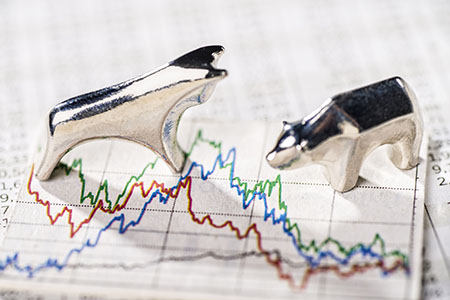Imagine the following scenario. You have been saving over the last 10 years for a specific purpose such as a house deposit or to pay towards a family wedding. Over this time, you have been steadily putting your money into an equity portfolio made up mainly of US, UK and European stocks. Leading up to 2020, you can look back happily on a near 11-year global bull market since the 2008-9 Financial Crisis, leading to a considerable rise in your investments.
Yet as you near the point where you want to take out the money, there is a drop in the investments, such as that which happened in March 2020, and suddenly your portfolio is down nearly 25%, wiping out many of the gains from the last ten years. What should you do?
For many people, the answer may be to ‘get out quick’ before any further damage can be done. Yet what would this achieve? One certainty is that it would have solidified your losses. However, delaying the decision to sell your investments and take the cash could have given your portfolio a chance to recover, as stock markets gradually climbed back up over the course of 2020.
Is cash safer than investing in markets?
Scenarios like the above can worry people. Why not just invest in cash if you risk losing much of your capital in other assets like equities? Although understandable, this impulse is not always rational. First of all, cash is not free from risk. Whilst cash savings will not move in line with the stock markets, they are more vulnerable to inflation. If your interest rate is 1%, for instance, yet inflation stands at 2% within a given year, then you lose 1% of your savings in real terms.
Secondly, cash can come with an ‘opportunity cost’ compared to investing. An example might help to illustrate what we mean. Suppose you save £5,000 a year in cash over 10 years, leading to about £52,000 (with 1% interest) which you will put towards your house deposit. In another scenario, however, you could have invested the annual £5,000 in a portfolio, returning a 6% average per year (after fees and taxes).
By Year 9, this pot could be worth about £59,307. In the years leading up to your planned withdrawal, moreover, you gradually move your assets into ‘safer’ investments such as UK government bonds and cash – which do not move with the stock market. This provides some protection. For instance, suppose disaster strikes in Year 10 and stock markets plummet, say, 25%. Here, the total value of your portfolio may only fall 5% or so (about £3,000) – leaving £56,307 in the pot. If you decided to withdraw everything at this stage, then you are still better off compared to having simply saved into a cash account over the past 10 years. The latter choice, in other words, could have incurred a significant opportunity cost – even if it felt safer.
Managing investment risk and reward
Investment risk can be managed to a significant degree, provided you have an appropriate long term strategy. For example, for many people it makes sense to adopt a ‘higher risk; higher reward’ investment strategy when building wealth over, say, two or three decades. This group might include professionals early in their careers looking to build up a pension pot. As they approach the ‘drawdown phase’ when they will start wanting to take the money out for retirement, however, then they may wish to slowly shift investment strategy with guidance from their financial planner.
For instance, perhaps someone in this ‘drawdown stage’ is no longer comfortable holding 90% of their portfolio in equities and would prefer to move towards a 50-50 split between stocks and bonds by the time they retire. Whilst this strategy would likely lower the investor’s returns, it also helps to cushion the portfolio against future market volatility. Another person, however, may prefer a different asset allocation due to a distinct attitude to risk and alternate financial goals.
Principles to remember
Risk is an inevitable feature of any asset, be it cash, equities or bonds. One core principle of investing, therefore, is to consider diversifying your portfolio across different types of assets. This allows you to draw upon the distinct investment strengths of each asset whilst mitigating their weaknesses. The precise mixture of assets you choose, however, will depend on a range of factors including your investment horizon, your goals and tolerance for risk.
The advantage of working with a financial planner is that they can help you work through these issues more rationally, offering recommendations on areas which you might have overlooked and helping to improve real returns by identifying tax-efficiencies and ways to reduce investment fees. They can also help you to keep a cool head in a volatile market, drawing your attention to the lesson of the past i.e. that time in the market generally rewards investors more than trying to time the markets (guessing when they will rise and fall). Remember that successful investing rarely emerges from reactive, impulsive behaviour, such as panic selling during a bear market.
Invitation
If you would like to discuss your financial plan and investment strategy, then we would love to hear from you. Get in touch with your Financial Planner here at Vesta Wealth in Cumbria, Teesside and across the North of England.
Reach us via:
t: 01228 210 137
This content is for information purposes only. It should not be taken as financial or investment advice. To receive personalised, regulated financial advice regarding your affairs please consult your Financial Planner here at Vesta Wealth in Cumbria, Teesside and across the North of England.

